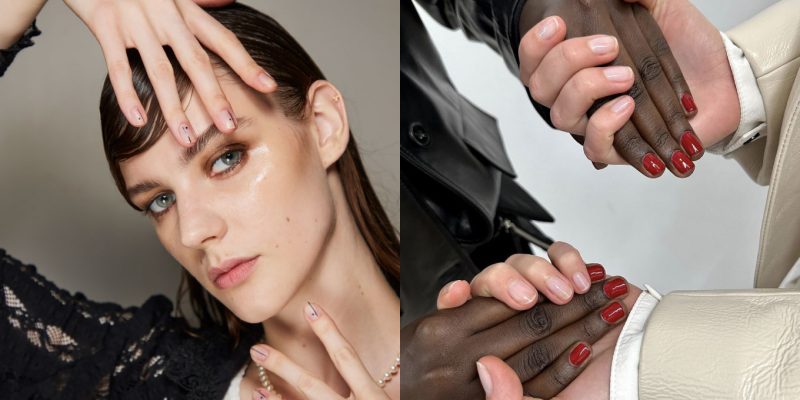Makeup & nails
Cheat on Your perfume
Monogamy is old news…at least when it comes to perfume
by : Vanessa Craft- Dec 31st, 2010
Good news for those struggling to stay faithful: It’s okay to cheat on your perfume. Staying loyal to one fragrance has never been easy—not with the multitude of tempting and seductive options wafting up from the shelves—but now it’s time for grown-up girls to toss their olfactory calling cards aside. Keeping a well-honed collection of perfumes in rotation is the way to go.
“Having a signature scent is passé,” says Luca Turin, author of Perfumes: The Guide, which reviews, rates and harps lyrical on nearly 1,500 perfumes with the aplomb of a well-versed food and travel guide. Turin thinks seeking a signature fragrance is “a cute idea in theory, but it’s like being proud of having read only one book. It better be a good one!”
Turin is a wonderfully outspoken fragrance critic and olfactory scientist in London, England, with a PhD in biophysics. He joins the rising ranks of perfumers, reviewers and customers alike who think sole signature scents are archaic.
“Some people swear by the idea of finding a single signature perfume, but there is a danger of falling into the fragrance equivalent of a blue eyeshadow time warp,” warns Canadian-born, San Francisco-based artisan perfumer Ineke Rühland, who is one of the few classically trained “noses” in the world. She created her growing collection of five luxury fragrances for women who are looking for variety on their dressing tables. “I strongly believe that different fragrances work best according to the season, occasion and mood,” she says.
The idea of signature scents being obsolete has been mentioned as far back as 1985. In her autobiography, Estée: A Success Story, Estée Lauder wrote: “Another myth suggested that women choose a fragrance and wear it day and night. It would become her signature. But fragrance, I knew, was much more than a signature; it was a whole personality! I knew it was old-fashioned to stick to one scent… why not have a rich and varied perfume wardrobe?”
Turin says it’s more logical to cater to the multi-faceted aspects of your life and personality. “A woman doesn’t wear perfume to go jogging in,” he opines, “so why does she have to choose a sporty fragrance to wear at other times?” Indeed, a romantic night out may be better suited to a headier, more seductive perfume than you would wear in the daytime.
Nahla Saad is the creative director of Noor boutique in Toronto, which houses several high-end, niche fragrance lines and is known for its gentle guidance to women keen on building an assortment of perfumes. “Often women won’t give themselves permission to like more than one thing,” she says. “Women who become collectors feel as though they’re engaging in some sort of undercover, guerilla activity.”
Keep it fresh
Another reason why it’s important to switch things up a bit? Olfactory adaptation. Just as you lose the ability to know what your home smells like, it’s easy to become desensitized to your own perfume. This can lead to nuclear levels of perfume cloud application or a robotic “spritz and go” disconnection to your fragrance.
“You need to be an active participant in the ritual of putting on perfume,” says Saad. “It’s a pleasure to enjoy, and when you have different ones to choose from, you tend to be more invested and aware of your present mood and experience.”
In 2007, retail sales of fragrances in Canada approached $648 million and trends suggest that the 40-plus market is more brand loyal than younger buyers. An obvious question arises: Do the big-name manufacturers want to jump-start the purchasing power of the older demographic? Is the signature scent “backlash” just a marketing ruse to get you to spend more money on perfume?
“Of course it is,” says Roja Dove, founder of the Roja Dove Haute Parfumerie at Harrods in London. “I’m sure many women are made to feel they are failures if they don’t have a collection!” Dove, a world-renowned perfumer, goes so far as to suggest that the president emeritus of the Fragrance Foundation in New York City, Annette Green, created the idea of a fragrance wardrobe to increase sales volumes and “the world fell for it.”
Shopkeepers benefit from women buying more perfume, certainly, but so do women themselves. Of course, “technically speaking, scent is not a necessity, it’s not medicine,” says Saad. But “it’s a vanity that can conjure up all these stories and memories and transport you somewhere else. It’s a wonderful promise. No other beauty product can do that for you.”
Marian Bendeth, a global fragrance expert and owner of the Toronto-based perfume consultancy company Sixth Scents, calls fragrance “wearable art.” “It’s also an important investment in your self-esteem,” she says. “Perfume is your walking biography; it speaks for you before you even open your mouth, and it’s important that you have the right scent for the right moment or emotion you wish to express.”
Considering how individual olfactory memory and the connection to smell can be, it’s not surprising that many women feel dissatisfied with some of the mass-produced scents on the market.
One solution is to go niche
“It’s a palpable trend,” says Saad of the increasing migration of scent-seekers to independent, lesser-known fragrance houses. Both Saad and Turin feel the trend is largely due to the Internet, which has raised formerly low-key perfume houses to celebrity status through online communities, blogs and websites dedicated to perfume. It’s now easy for smaller perfumers to efficiently sell their wares directly online (although Rühland’s fragrances are stocked in 65 shops in the United States and Canada, she does 20 per cent of her business via the web; Noor ships any online or telephone order across Canada).
“Niche fragrances appeal to women looking for something more adult than what most of the mainstream manufacturers are offering,” says Rühland. Her biggest customers are women over 40. “The more niche brands don’t tend to focus on advertising images of the latest celebrity or top model; it’s all about the scent itself.”
“Niche fragrances are like hidden little secrets,” explains Nat Penno, vice-president of cosmetics and beauty services at Holt Renfrew in Toronto. “They’re infused with exclusivity and they appeal to shoppers looking for something new and different from the norm.”
Staying with the mainstream can still be satisfying. There are numerous well-composed and exciting “masstige” fragrances on the market. It just may take some digging or stepping outside of your comfort zone to find the right one.
“A more mature woman knows who she is and wants something complementary to that – she certainly doesn’t want to be airbrushed or smell like a teenager,” says Bendeth. “But it’s also important when you’re looking for a scent not to stereotype or pigeonhole a perfume.”
Bendeth cites an example of the provocative imagery and spiel for the perfume Vraie Blonde by Etat Libre d’Orange: Is she a real blond? You’ll have to wait until she is nude to find out. “It’s an image that could put you right off and you would make obvious assumptions about the type of woman it’s made for. But if you actually smell it, and go on your own journey with it, you might love what’s inside the bottle.”
Turin advises not getting caught up in the “snob” factor of rejecting mainstream fragrances that the critics might not appreciate. “If you love the way something smells, buy it and ignore the aficionados who claim a fragrance is déclassé,” he says, citing Tommy Hilfiger’s Tommy Girl and Prescriptives’ Calyx as two “tremendously good” perfumes that would be seen as masterpieces if they were sold by an exclusive fragrance house for hundreds of dollars.
And take heart: Even if the trend dictates a move toward polygamous pleasure, not everyone believes signature scents should be abandoned.
Jacques Cavallier, a master French perfumer who has created scents for Issey Miyake, Yves Saint Laurent, Givenchy and Calvin Klein, and worked on Lancôme’s latest release, Magnifique, says the relationship between a woman and her perfume is—and should be—like a marriage.
“It’s a very personal and unique connection,” he explains. “For example, I think a woman falls in love with the man who stands out from the crowd and is very distinctive to her. Perfume is the same.”
“I don’t think it’s old-fashioned to have a signature scent,” agrees Dove. “Underneath we all love a capricious flirtation…but at the same time, there are many women looking for something they can feel is truly theirs alone.”
What’s it all mean?
Chypre A popular genre of perfume based on oakmoss, bergamot and cistus labdanum (a sweet, woody, slightly smoky or leathery type of resin)
Drydown The last stage of a fragrance’s release, after the top and heart notes have faded
Gourmand Part of the oriental category of fragrances, usually heavy on the vanilla or dessert-like smells
Heart note The true personality of a fragrance, appearing 15 to 20 minutes after application
Note Indicates an olfactory impression of a single smell, such as a note of jasmine and a note of clove
Oriental A fragrance type with an emphasis on amber
Soliflore A perfume that represents just one flower; for example, rose soliflore will smell only of roses
Top note “The money shot,” according to London-based perfume expert Luca Turin – the scents that are perceived within the first few minutes of a fragrance, when the most lightweight elements evaporate
Scent is inextricably linked to memory, which is why one woman’s love of white floral fragrances can make another recoil with remembrance of a funeral or a wedding gone bad.
“Un Jardin Après La Mousson [by Hermès] is full of melon and grassy allusions, of summer days and camping by the river,” says Toronto-based global fragrance expert Marian Bendeth. “It fills me with memories of strolling along Main Street in Unionville, Ont., with my dog.” Bendeth explains how your own associations with scent are good starting points in the search for new perfumes. “If you were born in Egypt, the smells of jasmine or foliage may be comforting or familiar to you. Someone from a hot climate or country might be attracted to certain spices in a fragrance. Based on what you presently wear, your tastes will, most likely, lie in one or two fragrance classifications, which may include citrus, white floral, sweet floral, green, woody, amber, oriental spices, gourmand or abstract scents.”
Advice for the olfactory challenged
- If you’re not sure what smells you like, pinpoint scents you abhor and can take straight off the list – like that 400-watt blast of sugary sweet bouffant left behind by a colleague in the elevators every morning.
- “Narrow your choices by spraying on blotters first,” advises San Francisco-based artisan perfumer Ineke Rühland. “Then try a maximum of four on your skin.” Always allow at least 30 minutes for the scent to develop before making a decision.
- Skin chemistry plays an important role. According to Nahla Saad, creative director of Noor boutique in Toronto, “The amount of oil you have on your skin affects the longevity of the fragrance. As we age, skin tends to get drier so you want to keep skin well moisturized or use a perfumed body lotion to keep skin scented and soft.”
- “Bruising” a fragrance sounds like hooey, but go easy on application. Don’t rub fragrance too vigorously into your skin – you’ll heat up the perfume, causing many of the top notes to evaporate before their time.
- No perfume will smell pretty if applied with poor etiquette. “It shows good manners to avoid applying fragrances just before getting into enclosed areas like meeting rooms, airplanes or public transport,” says Rühland (who thinks Canadians are particularly polite when it comes to matters of scent). This is especially true at the office, says Toronto-based fragrance expert Marian Bendeth. “If you’re a working woman, you shouldn’t be in the office smelling like a dusty powdery doughnut or a patisserie…. Ask yourself, ‘Would I want to sit next to myself all day?’”
Newsletter
Join our mailing list for the latest and biggest in fashion trends, beauty, culture and celebrity.
Read Next

Beauty
The Best Met Gala Beauty Looks Of All Time
From Taylor Swift's 'Bleachella' era to Rihanna's iconic 2011 braids, meet the best beauty moments in Met Gala history.
by : Katie Withington- Apr 26th, 2024

Culture
Benny Blanco Says He Fell in Love With Selena Gomez Without ‘Even Noticing’ It
Allow Benny Blanco to tell the straight-from-a-rom-com story of how he realized his feelings for his girlfriend and longtime friend.
by : Alyssa Bailey- Apr 26th, 2024

Beauty
Summer Prep: How to Feel Confident in Your Swimsuit
New Size-Inclusive Swimwear: Gillette Venus partners with The Saltwater Collective to Launch a Collection for Any Body
by : ELLE Canada- Apr 24th, 2024




